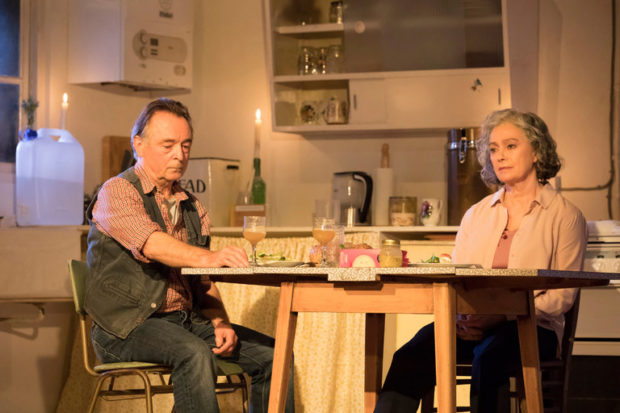You have no items in your cart. Want to get some nice things?
Go shopping
Scrolling through Facebook a few days ago, one of my more politically-minded friends had shared a post questioning how parents can swear they’d “do anything for their children” while doing little to avert the coming ecological catastrophe (according to the UN, 2016 was set to be the hottest year on record). For them, bad environmental stewardship is simply bad parenting; leaving your children to inherit a world of rising sea levels and diminishing fossil fuels is just another form of neglect.
Lucy Kirkwood’s new play at the Royal Court, The Children, seems to be coming from a similar place. It centres on a trio of ageing scientists recovering from the aftermath of a catastrophic accident at a nearby nuclear power plant. With the UK’s sustainability hopes pinned on the planned Hinkley Point C, nuclear is certainly topical, but The Children isn’t really about nuclear power – it’s about different conceptions of responsibility and parenthood, growing old and renegotiating your place in the world.
It’s easy to miss just how much is going on in The Children, mainly due to Kirkwood’s faultless ear for dialogue. Trains of thought are messy; conversations loop back upon themselves – it feels odd to look for something as artificial as themes or leitmotifs. Miriam Buether’s set design too is convincingly naturalistic; the light slowly fading through the kitchen window and the distant sound of the sea are enough to give you a sense of the irradiated world outside. Lulled by the piece’s realism, it’s easy to think you are simply eavesdropping on three sixty-somethings getting sloshed on parsnip wine, missing the subtler aspects of Kirkwood’s storytelling.
Though the first half of The Children is noticeably quieter than its fraught and morally-challenging conclusion, Kirkwood has already begun to sow the seeds for her environmental message. Hazel (a predictably fantastic Deborah Findlay) needs to be in control, both of her body and her surroundings. “When we have a picnic we don’t just clear up our own litter, we go around and pick up other people’s too,” she explains. “That’s our policy, leave a place cleaner than you found it.” In performance it may strike the audience as another example of the kind of dithering tangent that makes Hazel the most believable character of the trio, but the crux of the play is that the three pensioners haven’t “left the place cleaner than they found it.” Rose (Francesca Annis) is here to remind Hazel and her husband Robin (Ron Cook) that their – and really our – lifestyle which necessitated the nuclear plant in the first place has to change. In my favourite line of the play, Rose tells Robin “we can’t have everything we want just because we want it.” Like it or not, self-denial and a radical re-evaluation of how we consume energy may be the only way forward.
In Kirkwood’s imagined future, nuclear is not the quick-fix we hope it will be, and certainly not an excuse to advocate responsibility for the environmental impact of our lives. Rose, herself voluntarily childless, calls Robin and Hazel’s decision to have four children “fucking irresponsible” due to its environmental impact – indeed in 2009 it was calculated that each new baby in the US adds 9,441 tonnes to its parents’ carbon footprint. It reminded me of a scene from Dennis Kelly’s cult Channel 4 series Utopia in which a character attacks a mother’s decision to reproduce: “Nothing uses carbon like a first world human, why would you do that?” More than this, is it right to bring a child into such a radically destabilised world in the first place? In a recent interview with The Guardian, Kirkwood admitted that her father had his doubts about raising a child amidst the spectre of nuclear annihilation during the Cold War. Once again, you get that sense that parental responsibility is a lot more complicated than it seems.
Another line of Rose’s which struck me during the performance was “you don’t have a right to electricity […] Half the developing world exists without it.” On reflection I – and I imagine most people – do subconsciously see electricity as a right. It’s a nice moment which Kirkwood partly spoils with Hazel’s rejoinder “well perhaps they should develop then”. It’s a bit too clear of a signpost for where our sympathies ought to lie, and a little inconsistent coming from a character who once described herself as a socialist.
There were a few more imperfections which detracted from the whole. Some (quite literal) toilet humour pushes things too much in the direction of farce, and a quiet performance by Annis (along with some vague characterisation from Kirkwood) sometimes threatened to relegate Rose to mere plot device, there to spell out the piece’s moral dilemma. On the other hand, Kirkwood’s dialogue is unlikely to ever sound as good as when it comes from Findlay, and her character arc as Hazel made The Children much more than a play of ideas. Cook also carefully controlled the audience’s response to Robin, transitioning seamlessly through loud and boorish to understated nobility.
So who are the children of Kirkwood’s title? The under-thirties risking their lives to clean up the previous generation’s mess, referred to as “children” by Rose? Robin and Hazel’s damaged and dependent middle-aged daughter Lauren, a representative of the next generation so unequal to taking up the mantle from their parents (admittedly a plot strand that deserved further development)? It’s a responsibility that goes far beyond the traditional demands of parenting and beyond our own offspring.
Kirkwood’s play has been criticised as an unsubtle attack on the baby boomer generation, but in my view it wears its intellectual content lightly. We learn enough about Hazel, Rose and Robin’s shared past for this to be a play about people as much as the environment, and there’s something fantastically British about Findlay and Annis’s fizzling passive aggression as everything crumbles around them. Admittedly you do sometimes get the sense that Kirkwood has a clear idea of what she’d like us to think, but at its best The Children feels real enough for the playwright’s controlling hand to disappear altogether.
The Children continues at the Royal Court Theatre until Jan 14. £10 tickets are available at 9am for the performance on Mon Jan 9.

About Simon Fearn
Simon is a student at Durham University and aspiring theatre critic. He has reviewed at the Edinburgh Fringe with EdFringeReview and is Stage Editor for Durham's student newspaper, Palatinate. He has also written music reviews for W!zard Radio and Cuckoo Review.




